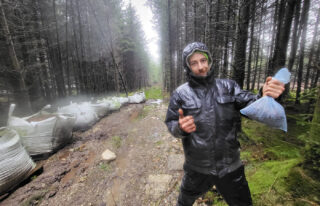This gardener cultivates nutrient-dense food in his garden, but his primary passion is living compost. James Taylor (aka Tay) started his growing adventure by creating quality vermicompost to supplement the nutrients in his pots. Much like a scientist, he took a keen interest in learning what makes ‘elite’ worm castings: nutritionally dense material.
During lockdown, he and his wife ended up in Pembrokeshire in a house with a large garden that needed some care. Tay describes it as the best time ever. Tay learned a lot about black gold thanks to dozens of podcasts, online groups, and a book by Jeff Lowenfells, ‘Teaming with Microbes.’ He learned that compost is not just a ‘product’; it’s a system of ecological interactions essential to plant growth. As his garden grew in new veg beds, his composting methods evolved; now, he incorporates techniques such as hot composting with Johnson-Su bioreactors. This method can produce biologically rich compost quickly thanks to an effective heating mechanism.

The quality of the final product can be measured and quantified by the number of micrograms of soil organic matter (SOM) per gram of soil. To an untrained eye, it looks like someone diluting some compost with water, putting a drop of solution on a microscope slide, and searching for strands of fungal hyphae, amoebas, nematodes or protozoans. During the growing expo, Product Earth, Tay met Adam Swan from Soil Agroecology Lab and Soil Smiths. Tay’s production of living compost improved, as did his microscopy skills. Recently, he found predatory fungi (not a nematode) that attack nematodes. The world under the microscope is so vast, and all of it plays a role in the nutrition of our foods.
Tay’s journey took him from working in industrial kitchens with little attention to nutrition to creating one of the most nutritionally dense composts, which feeds his soil and plants. Deeply understanding how it works is so rewarding that he shares his knowledge wherever possible. He’s proud to have supported two groups of startups in their vermicomposting journey, and he is currently creating living compost en masse for a regenerative tree nursery in Wales. The soil quality is crucial to the project’s success, and they’re using techniques such as DNA barcoding and microscopy to ensure a suitable microbiology and nutrient profile.